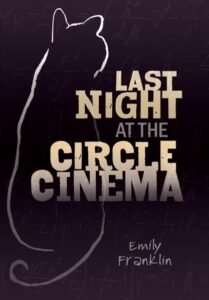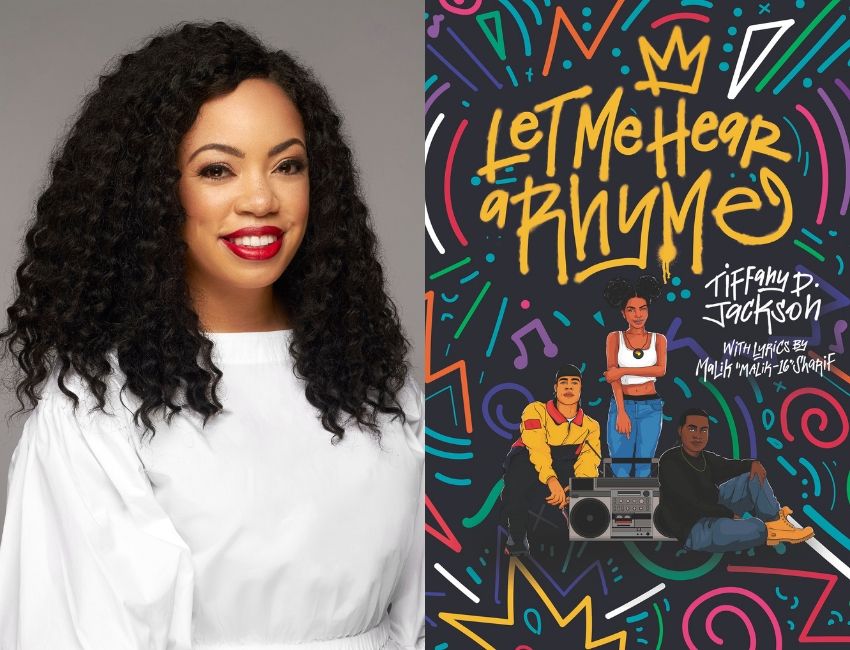#MHYALit: Puzzling Through Teen Mental Health, a conversation with Emily Franklin and H.A. Swain
 HA SWAIN: I love how Last Night at the Circle Cinema is constructed as a big puzzle in which you expertly lay down clues for the reader. It’s the kind of book you finish and then need to start again immediately to figure out everything you missed on the first read. Understanding one’s own mental health (or that of a friend’s) can feel equally puzzling, especially because life isn’t a story you can reread. Was this set up a conscious decision on your part as a way to comment on mental health?
HA SWAIN: I love how Last Night at the Circle Cinema is constructed as a big puzzle in which you expertly lay down clues for the reader. It’s the kind of book you finish and then need to start again immediately to figure out everything you missed on the first read. Understanding one’s own mental health (or that of a friend’s) can feel equally puzzling, especially because life isn’t a story you can reread. Was this set up a conscious decision on your part as a way to comment on mental health?
Emily Franklin: Yes, this book is about muddling through the puzzle of life. How often do we have clarity on our feelings? It’s tough to recognize a tough day versus a really tough stretch, or to translate this into a needing help situation. Therapy and talking to an empathetic listener really can help untangle strands of stress or unhappiness, not only to make change in our lives but just to unload. But our society still has such negative feelings and stigma with mental health which then creates tension about asking direct questions. We wouldn’t hesitate to ask a friend how their broken leg is healing, but it feels tougher to ask if they are struggling with depression or grief. Issues without clear solutions or quick fixes are sometimes uncomfortable for humans to muddle through.
ADVERTISEMENT
ADVERTISEMENT
HA SWAIN: I really appreciated that you never explicitly state that Bertucci struggles with a diagnosed mental illness. Was that a conscious choice and if so, why?
 Emily Franklin: I don’t know that I ever sat at my desk and thought, you know, I just won’t say anything direct about this. The whole book is a puzzle, as you said, and part of the puzzle for all of us is figuring out the pieces of ourselves and how they fit with our world. Also how our friendships fit together and how even close friends have secrets or hide parts of themselves. And I think there’s an over-statement thing that can happen in fiction – both YA and adult – and I’m more a fan of quiet.
Emily Franklin: I don’t know that I ever sat at my desk and thought, you know, I just won’t say anything direct about this. The whole book is a puzzle, as you said, and part of the puzzle for all of us is figuring out the pieces of ourselves and how they fit with our world. Also how our friendships fit together and how even close friends have secrets or hide parts of themselves. And I think there’s an over-statement thing that can happen in fiction – both YA and adult – and I’m more a fan of quiet.
HA SWAIN: How much do you think Codman and Livvy understood about Bertucci’s situation? And what advice would you give to young adults who are watching a friend struggle with mental health issues?
Emily Franklin: I think Codman and Livvy – especially Livvy as she grew closer to Bertucci and helped care for his mother with him – were aware of his illness. At first they probably thought he moved in extremes but they liked his grandiose ideas and pranks, his energy. But I think Livvy knew he was unwell and certainly knew he’d stopped taking his meds. But like many close friends, she didn’t feel able to confront him about this, mainly because she hoped he’d be okay and also because it is easy to feel as though we are intruding in terms of mental health. I’ve learned as an adult that I will risk a friendship or relationship to ask if someone needs help or to speak up, but these actions are not risk-free. It’s even harder for teens to do because it’s a learned skill that we don’t teach.
HA SWAIN: I love how Bertucci is not defined by a diagnosis. He’s not just “the depressed guy” or “the bipolar guy.” Like any real person, he’s a wonderful conglomeration of character traits, some which make him incredibly interesting, enigmatic, fun, and endearing and others that are deeply troubling. What’s the importance of creating nuanced, realistic portraits of teens who have mental health issues?
Emily Franklin: When I set out to write this novel, I was coming out of the darkest period in my own life. One of my kids had been in the hospital and my dear grandfather had died, leaving a big hole in my heart. The thing is, I was still me. I was sad and depressed and yet I still cooked and helped my friends and did homework with my other kids and made weird jokes. But my best friend in the world knew I was only half-myself. So as I wrote CIRCLE I really had in mind the selves we present to the outside world, the self we show to the mirror, the self we share with our partners and this self we reserve really and truly for our best friend. I think Livvy and Codman and Bertucci are whole, nuanced people because I didn’t want make one the anxious guy and one the stressed girl and one the plagued kid. They are all entwined and, for Bertucci, I wanted him to straddle the line between inventive, brilliant, and wacky on one hand and unbalanced on the other.
HA SWAIN: We’ve talked a lot about Bertucci’s mental health, but let’s chat about Livvy and Codman. So many teens struggle with undiagnosed mental health issues at different times in their lives. How would you support a teen like Livvy who may be struggling with her own anxiety or dealing with a friend who’s going through a hard time?
Emily Franklin: I think Codman uses humor to gloss over his feelings – something I’ve certainly done. And Livvy is pretty stressed – her parents are about to separate and using her as their go-between. She’s a high-achieving person and probably spends more time taking care of others rather than herself. Livvy needs to be able to talk about her feelings – and I think she and Codman finally do in their confrontation at the end of the book. But I also chose to have these missed connections between Livvy, Codman, and Bertucci as well as their parents because it felt real. So often we WANT to speak or to connect but we hold off, and the moment is gone. In this case, to tragic consequence. With my own kids, we urge open communication, and to have this there has to be no judgment. I think a lot of parents are so afraid of what they might find by asking their kids deep questions that they say nothing and hope for the best.
HA SWAIN: So true! And yet, even though we hear so much about the importance of talking to teens about mental health, you had a hard time placing this novel with a publisher because many of them felt the story was too dark. What does that say about society’s level of comfort of talking openly about mental health, especially with young adults?
Emily Franklin: If I had a dollar for every time I had to read a rejection letter from an editor saying they loved my writing but wished my subject matter could be lighter…well, I’d have a lot of dollars. Carolrhoda is great because they take risks and Andrew Karre, my editor, immediately recognized the triangular friendship and the darkness being balanced with humor and love. As a society, we like to think of childhood as trouble-free. So it’s tough when issues arise – either from circumstance or biology or both. Being a human is a beautiful, difficult thing and we all need supports— young adults especially. Asking for things to be “easier and lighter” as these editors asked (one actually cried at the end and yet still asked me to make it “less sad”) is a fantasy. Not that every day or every page contains within it such heartbreak, but we can’t dismiss the pain or feelings just wishing it away. We have to acknowledge and accept. Sometimes, just getting it out there – to a reader, a therapist, or a best friend or a stranger on the bus – can make all the difference.
About Last Night at the Circle Cinema (Lerner, 2015)
ADVERTISEMENT
ADVERTISEMENT
Olivia, Bertucci, and Codman are a trio-an impenetrable triangle of friendship. Beyond friendship, they share a love of the Circle Cinema, a once thriving movie theater now facing the wrecking ball, about to be forgotten forever-which is, as far as Olivia and Codman can tell, what’s going to happen to them after graduation.
Bertucci convinces Olivia and Codman to spend their last night before graduation locked inside the Cinema’s concrete walls. None of them can open the box before sunrise. The trio is then forced to face each other, the events of the past year, and whatever is to come when the new day dawns.

Emily Franklin is the author of a novel, Liner Notes and a story collection, The Girls’ Almanac. She is also the author of sixteen young adult books including Last Night at the Circle Cinema, selected by the American Association of Jewish Libraries as a Sydney Taylor Notable Book for 2016, a Junior Library Guild Selection, and an ALAN Pick. Her work has been featured on National Public Radio and in the New York Times, Boston Globe, and in numerous literary magazines. She lives outside of Boston with her husband and four children and is at work completing a new novel and another story collection.
 H.A. Swain writes books for children and teens. She is the author of the young adult novels Gifted and Hungry. Her illustrated children’s book, All Kinds of Kisses and How Many Hugs will be published in 2016 and 2017. She lives in Brooklyn, New York. Follow her @HeatherASwain or stop by her Facebook fan page to say Hi!
H.A. Swain writes books for children and teens. She is the author of the young adult novels Gifted and Hungry. Her illustrated children’s book, All Kinds of Kisses and How Many Hugs will be published in 2016 and 2017. She lives in Brooklyn, New York. Follow her @HeatherASwain or stop by her Facebook fan page to say Hi!
Filed under: #MHYALit
About Amanda MacGregor
Amanda MacGregor works in an elementary library, loves dogs, and can be found on Twitter @CiteSomething.
ADVERTISEMENT
ADVERTISEMENT
SLJ Blog Network
2024 Books from Coretta Scott King Winners
The Ultimate Love Letter to the King of Fruits: We’re Talking Mango Memories with Sita Singh
Double Booking | This Week’s Comics
Parsing Religion in Public Schools
ADVERTISEMENT







